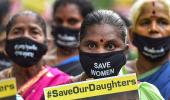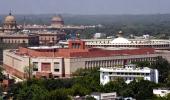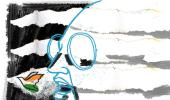'The idea of subversive activities is so vague that it could include making fun of the government, being critical of the government.'
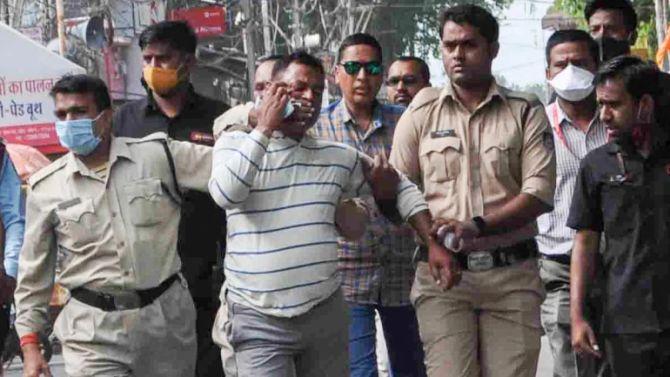
The Bharatiya Nyaya Sanhita Bill 2023 -- that envisages replacing the existing criminal jurisprudence under the Indian Penal Code, Criminal Procedure Code and Evidence Act -- introduced in Parliament by Union Home Minister Amit A Shah -- has come in for severe flak from not only the Opposition but also from criminal lawyers and human rights activists for being vague, arbitrary, opaque and providing immense, unilateral powers to the law enforcement agencies.
In a two-part interview with Prasanna D Zore/Rediff.com, senior Supreme Court advocate Shahrukh Aslam discusses the Bharatiya Saksha bill (a bill to consolidate and to provide for general rules and principles of evidence for fair trial), the Bharatiya Nagarik Suraksha Sanhita (a bill to consolidate and amend laws related to criminal procedure) and the Bharatiya Nyaya Sanhita (a bill to consolidate and amend the provisions relating to offences and for matters connected therewith or incidental thereto).
What could you tell us about the three bills that the Union government tabled in Parliament during the Monsoon session and will come up for discussion in the Winter session: The Bharatiya Saksha bill, Bharatiya Nagarik Sanhita and Bharatiya Nyaya Sanhita?
These names are all Sanskritised. In simple words, what would these three bills envisage?
Since you've brought up the matter of the Sanskritised language, I do want to say that in his Independence Day speech, the prime minister congratulated the Supreme Court for its efforts in translating operative portions of judgments in the vernacular. He evidently understands the importance of democratisation and decentralisation of language, especially in the courts, and in legal documents.
So it's a surprise that the names of these very essential laws are so Sanskritised, and linguistically alien to so many people, not least to those accused (indigenous people, Muslims, unlettered poor people) who have the most encounters with the criminal justice system. They're not in the vernacular. They're not the everyday language of people.
This linguistic hegemony is slightly dissonant from his Independence Day address.
That is just about the language; in terms of the contents of it (the Bharatiya Saksha bill, Bharatiya Nagarik Sanhita bill and Bharatiya Nyaya Sanhita bill), in very broad terms, a few things are, again, quite dissonant.
There are two running themes. One is ambiguity. And that's never very good for laws, especially criminal laws.
The other running theme is concentration of power, together with discretion in the hands of the law enforcement authorities, which, again, is quite colonial in terms of its origins.
I'll give you some examples in terms of colonial power and how it was exercised very specifically in terms of the criminal justice system.
The tradition in India has been for arrest to happen at the commencement of investigation. So any time that there's an offence, any time an FIR is registered, the tradition has been to just haul people into custody and then beat them into either giving a confession or explaining what has happened. That has been the culture of investigation -- our class-caste based legacy.
Whereas everywhere else (in other countries), the arrests happen at the end of the investigative process. Only when you've independently collected evidence and when you're ready to confront the accused with that evidence can you bring them in and then detain them without charge for very limited periods of time.
Elsewhere, the time that is allowed for detention without charge is in hours; it is 6 hours or 12 hours or at the most 24 hours.
In the case of terrorist offences, it's 7 to 14 days. And that's considered exceptional circumstances.
In India, the law allows for extended periods of detention without charge -- always been 60 days or 90 days or 180 days. Now that is extraordinary.
In other jurisdictions there has been debate and discussion about this. You can't have periods of detention without charge for that long. I just want to also reference two debates that happened in our Parliament and the British parliament respectively.
After the 2008 Mumbai attacks, our Parliament had a debate about whether we need to increase the time of detention without charge. The government of the time -- the United Progressive Alliance led by then prime minister Manmohan Singh -- said in Parliament that we'll give you (the law enforcement agencies) 180 days under the UAPA (Unlawful Activities and Prevention Act), and that was a gift to the investigating authorities.
The Unlawful Activities (Prevention) Amendment bill, 2008 were steered in the Lok Sabha on December 17, 2008: 'We have made a provision of 180 days under this law. Our laws are tougher than that of America and England. Can you give me the example of any other country, where such laws exist?' asked Mr Kapil Sibal with pride in the Lok Sabha in 2008.
This legitimised a certain 'culture of investigation', which relied not on independent investigative techniques, but on arresting people and beating them for information/confessions. This again carried forward a colonial/feudal legacy that disempowered sections of the population.
After the London Tube attacks of July (2005), they also had a similar debate where they also wanted to extend the time of charge without detention for terrorist offenses to 90 days with the permission of a high court judge.
There (in England) the parliament said that this (detention for 90 days without framing charges) is a travesty to human liberty; this can never happen because the tradition is not for investigators to beat suspects into confession. So that is the difference.
The point now is that this code reiterates and reinforces this culture of investigation while ostensibly wanting to break away from its colonial past.
The second point that I want to reiterate is that in most jurisdictions they bring in their terrorist laws only in exceptional circumstances. Most jurisdictions get along by just using their ordinary criminal penal codes, even to deal with charges under terrorism.
You would note that even (Ajmal) Kasab (one of the eight terrorists who killed more than 180 people in the Mumbai terror attacks on November 26, 2008) was tried under the IPC (Indian Penal Code) and the CrPc (Criminal Procedure Code), not under POTA (Prevention of Terrorist Activities Act).
Even with other terrorist offences, we have managed with the IPC/CrPC. To my mind, the IPC/CrPC are quite capable of getting proper investigations and successful prosecutions. What these terrorist offences do basically is give much more power to the investigation authorities.
With the new codes, a lot of provisions of the special terrorist laws, with much more powers granted to investigation and prosecution authorities, and correspondingly much less freedoms for the accused, are brought centre stage. That to my mind is completely unnecessary. It normalises the security laws, which were originally considered exceptional.
What used to be exceptional is now the mainstream.
Is there now complete dilution between ordinary crimes and acts of terrorism?
Not a complete dilution, no. The categories are maintained in the new code. However, the IPC earlier did not define terrorist laws. We had extraordinary laws like the UAPA, which defined terrorist offences and which had a separate procedure for dealing with people accused of having indulged in terrorist acts.
Now the Nyaya Sanhita (penal code) also defines 'terrorist acts' and does so very loosely.
The third issue in terms of formalising structural violence, our colonial legacy, is that a lot of safeguards that had come about because of case law and precedent, in terms of the police not being allowed to handcuff suspects, etc, all of that is now being reiterated and reintroduced in the new Bills. So the police will be significantly more militarised, modelled probably on the US police.
The new Bill states that the police may use handcuffs. Obviously now, handcuffs will become much more normalised.
More worryingly, there's now also a discretion given to the arresting officer to use whatever means necessary, whatever force necessary at the time of arrest. That is again very ambiguous and it gives very significant powers to the arresting officer.
They can shoot and they can say that that was what was necessary because he (the accused) would have escaped otherwise.
Similarly, women could be arrested after sunset in exceptional circumstances. But exceptional circumstances are not defined. They're left to the discretion of the arresting officer.
Broadly, a lot of these things already happen, but which were considered foul practices are now being formalised and legitimised in the new code.
Some of them are colonial legacies that we should have actually thought through and discarded along the way, especially in terms of the manner of investigation and arrest as commencement of investigation and long periods of detention without charge.
That is one grievance that I have with the new code and also this ambiguity about what relationship we will have now with all the case law and all the jurisprudence that has developed around the old codes.
That's not very clear because a lot of case laws, especially in terms of D K Basu guidelines, which bar the use of handcuffs etc, all of that is now being removed; so what relationship will we have with the old jurisprudence (is quite unclear) and why the sudden rupture.
Yet another problem is the ambiguity in substantive laws. It is being said that 'sedition' has been removed from the statute books, but it is very much there in an even more overbroad and vague form.
The new code makes 'subversive activities', which are left undefined an offence.
The idea of subversive activities is broad; it is so vague that it could include anything. It could include making fun of the government, being critical of the government.
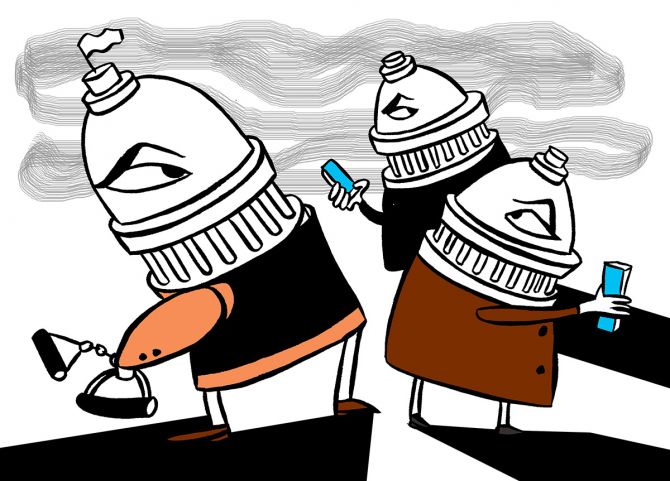
Who decides what is critical of the government?
Well, at the time, the law enforcement agency might decide, and then you take them to court, and then you challenge it in court, and then the court will decide.
But the problem is that if an FIR is sought to be registered, it's the SHO who might decide. He might register an FIR and he might arrest you saying that to me it sounds like subversive activity. And then you challenge it in court eventually.
But now, because arrest is so easy, and detention without charge is so easy that you arbitrarily spend some days in jail, before (and if) you are given bail. It is quite carceral, the new code.
Similarly, with this new addition of terrorist act into the penal code, into the Nyaya Sanhita, that definition is equally vague. For instance, damage to property in itself is included in the definition of a terrorist act.
You could damage a structure during a rally or a dharna, and that could be construed as a terrorist act.
Another one says to provoke or intimidate the government could be construed as a terrorist act. To provoke the government is as vague and as broad as it can be.
What even is intimidation? It doesn't say violent resurrection. It could be an article that I have written that could be seen as a provocation or an intimidation.
Another section that is being talked about a lot is this recognition of mob lynching. Killings that occur on grounds of somebody's identity, race or religion or caste, etc have been recognised. But the ambiguity here is that the punishment, the sentence, is discretionary.
It could range from death sentence to life imprisonment to seven years imprisonment. Now, that discretion, that ambiguity is unexplained.
If it's murder, if it's a killing, then why seven years?
Again, very pointedly, the punishment for concealing your identity before marriage -- which corresponds to this idea of 'love jihad' (a theory propagated by right wing Hindu organisations that Muslim men marry Hindu women with the sole aim of converting them to Islam) -- is ten years. So a lot of offences reflect the politics of the current political discourse.
So mob lynching could have a punishment of as less as seven years, and concealment of identity could have punishment of ten years.
- Part II of the Interview: 'You're provoking me, so off you go to jail'

